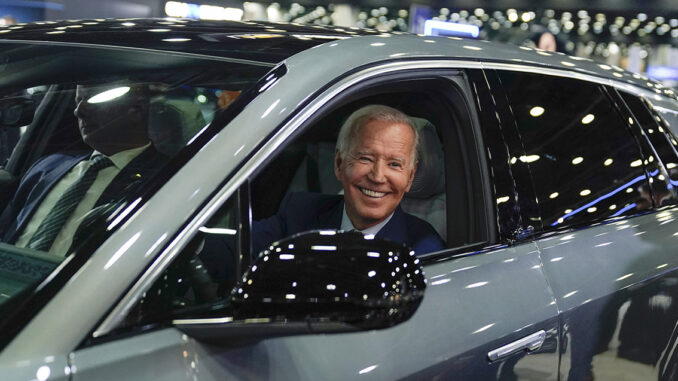
TOLEDO, Ohio — Donald Trump says the Biden administration’s policy to promote electric vehicles is a “radical plan” that would kill the economy in automaking states. Republican allies in the petroleum industry have spent millions on ads that say President Joe Biden’s tax credit for EV buyers will cost Americans their freedom.
Trump, the presumptive Republican presidential nominee, and others say Biden’s push for EVs is unfair to consumers, amounts to government overreach and ultimately will be a liability for Democrats. Trump even squeezed in an attack at the top of his remarks Friday after his criminal conviction in New York.
Democrats have been less vocal and more nuanced, advocating Biden’s climate reduction goals while promoting homegrown technology over competition from China.
However, interviews with about 20 voters in the pivotal industrial heartlands of Ohio and Michigan reveal a more complicated dynamic among people who may decide the winner of November’s presidential and Senate elections.
Toledo has produced Jeeps since World War II and is home to oil refineries.
It’s here where people say issues such as the cost of gas and groceries will be more critical than EVs when they vote. However, during the interviews with people across the political spectrum, many were skeptical of the vehicles and critical of the Democratic president’s tax credits.
“You cannot be shoving EVs down our throat,” said Joe Dempsey of Oregon, Ohio, who drives a Toyota gas-electric hybrid that does not require charging. “Let the American people decide if it’s going to happen.”
Republicans, long unable to crack Ohio Sen. Sherrod Brown’s blue-collar backing, see linking him to Biden’s sweeping 2022 Inflation Reduction Act, which created tax credits for EV buyers, as one way to do it in an election year.
Brown voted for the act, aimed at fighting climate change in part by providing a $7,500 tax credit for new EV sales to spur steps toward the president’s goal of making EVs 50% of all new vehicle sales by 2030. Republicans and their allies routinely refer to the policy as a government mandate.
However, Brown has pledged to oppose a rule change proposed by Biden this summer that would allow EVs built in the United States but with Chinese-made components to qualify for the credit.
“This will allow China to infiltrate the American auto supply chain, at American taxpayers’ expense,” Brown said in May. “American tax dollars should support American manufacturing and American workers — not enrich Chinese companies.”
Brown, a progressive with a pro-worker mantra, has little to worry about maintaining his party’s base. However, former Ohio Rep. Tim Ryan, a fellow Democrat, said he appears to be aware of the risks of being seen as allying too strongly with Biden, who is unpopular in Ohio.
“Sherrod doesn’t have to worry about Democrats. They love him,” Ryan said. “The question is, can he make up the middle? I think he can.”
John Hiskey, a Vietnam veteran from Toledo, thinks EVs are a great idea. He doubts the industry would be this far along without a push from the government, but he is interested in getting one so he can visit his grandkids without making multiple stops and taking time to charge the vehicle.
“I don’t want to wait a half-hour unless they start putting them in bars,” said Hiskey, adding that his vote will not be influenced by which party or politician backs EVs.
Others said the vehicles are cost-prohibitive, even with the tax credit.
Veteran Democratic strategist Joel Benenson, a pollster and senior adviser to Barack Obama’s and Hillary Clinton’s presidential campaigns, said one unifying call for Americans to embrace the technology, akin to President John F. Kennedy’s 1961 moon landing goal within the decade, is missing. “No one’s telling an inspiring story for EVs. So, how do you develop that story, and what will it mean for America going forward?” Benenson said. “That could be a powerful narrative.”



